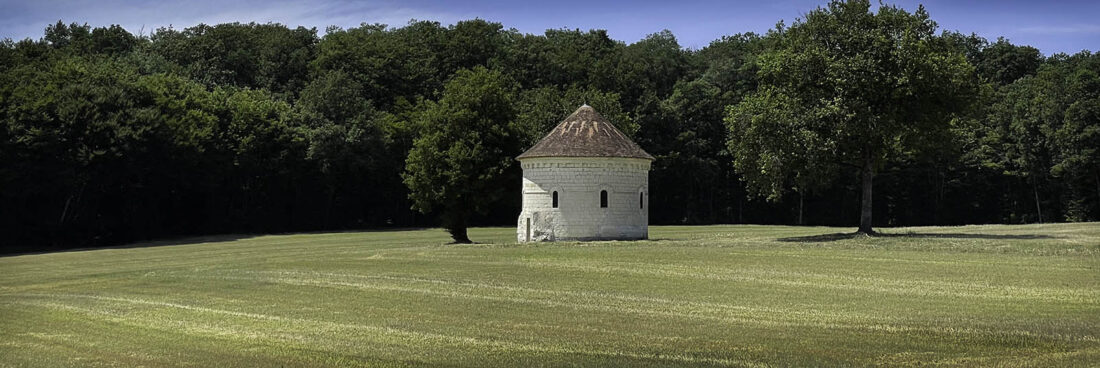
Road trip, part II: where did the good times go?
When I left you last on our European road trip we’d headed out of the tunnel from France to England with hearts full of anticipated adventure, fun, and not the least of it, great meals to be had. Turns out that only the first was true, and not in the way we imagined.
Oxford
We headed directly to Oxford—Sebastian was an offer holder—and he wanted us to attend a university-wide open house. The British system is different from the American one. A British university gives a student an offer to attend, most of the time dependent on the grades obtained at the big tests at the end of the academic year. There is no senior year coasting. And the results don’t come out until late summer.
We checked into a hotel that I am still not sure how to rank in my order-obsessed brain. Location? Great. Charm? Pretty darn high, but in an eccentric way. Room size? Smallest I’ve ever stayed in. Historical interest? High. Bathroom? Pretty damn awful. Mildew? Just maybe. Bath Place Hotel is a collection of tiny cottages around a cobbled courtyard, built in the early 1600s by Flemish weavers who were given permission to settle right up against the Oxford city walls. Before the weavers came there was a communal bath house, explaining the odd name.
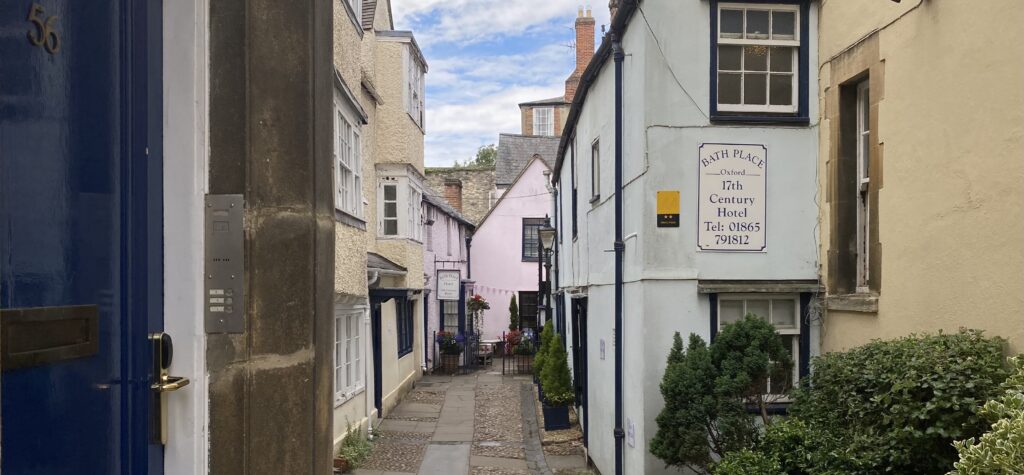
From the hotel’s courtyard there is a less than arms-width passage between two of the cottages that leads directly into the outside terrace of the Turf Tavern, where Bill Clinton famously did not inhale marijuana while a student. Its foundations date back to 1381 and it was built outside the town walls so that various kinds of illegal activity wouldn’t be under the jurisdiction of the colleges. In addition to Clinton, the Turf has hosted Ernest Hemingway, Steven Hawking, David Bowie, Oscar Wilde, Elizabeth Taylor, Richard Burton, C.S. Lewis, Margaret Thatcher, to name a few, and us. Although now very touristy I was still glad we went as I was toweringly tall when ordering at the bar, barely fitting under the beams. Others, more truly towering (over 5’4″), have to duck.
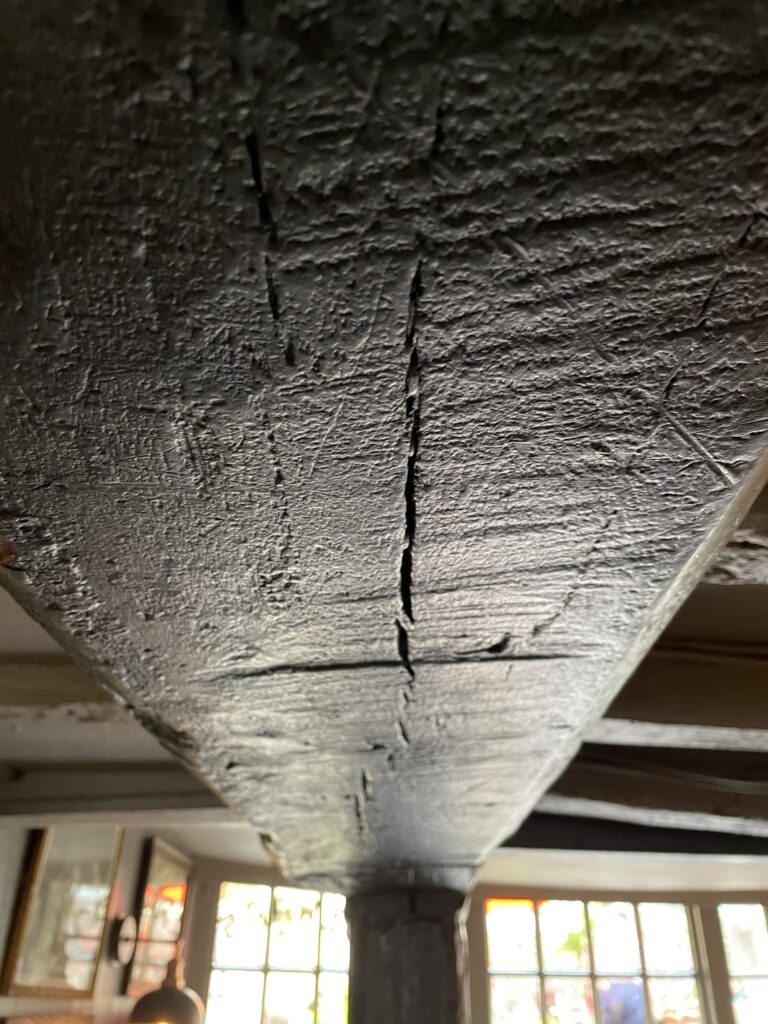
Just steps further was the heart of Oxford University, where the first courses were taught in 1096. Three of the oldest colleges were built in starting in 1249, so the architecture, as it evolved through the centuries with the creation of more colleges, is varied and truly beautiful. Oxford is made up of 44 colleges, which are usually closed to the public and the best you can do is to catch glimpses of the splendor within through metal gates, manned 24-hours a day by watchful porters who have heard every excuse from people wanting a look around inside. This weekend was special as all the colleges were open and we wandered through a few.
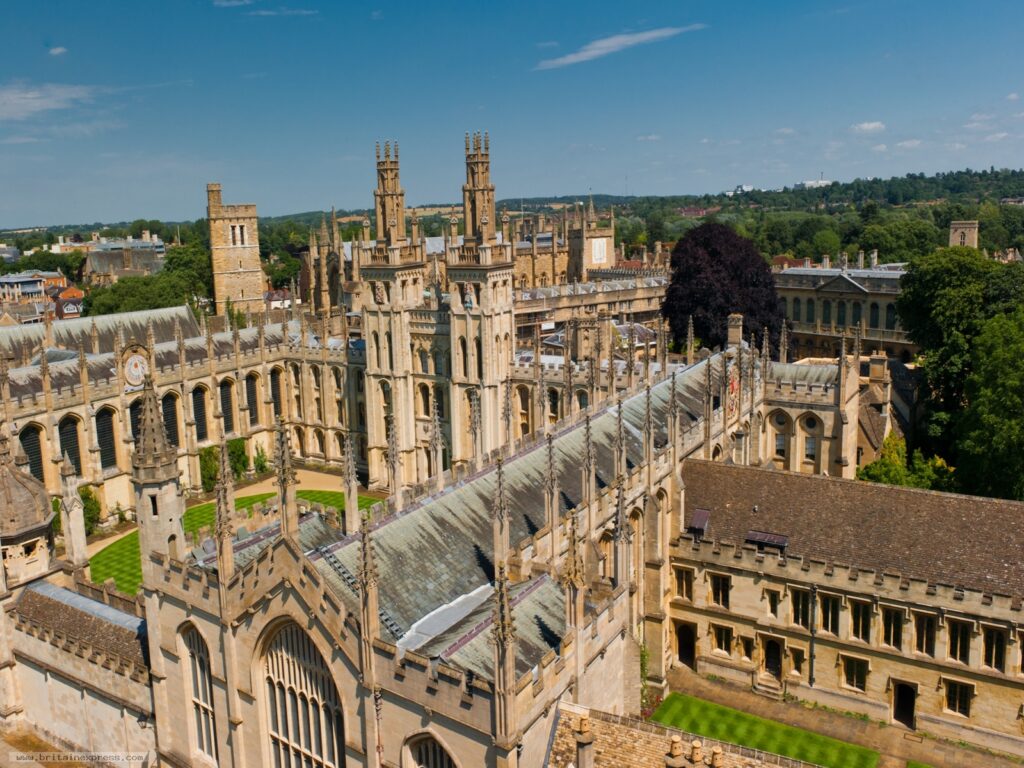
My current favorite of the batch is All Souls, which is a graduate-only academic research institution. Applicants have to take what is informally known as the hardest exam in the world—twelve hours of grueling questions—and those who survive go on to oral examinations. Beyond subject specific exams there are three general essays from a long list, including questions like: Should we bring back woolly mammoths from the dead?; If Margaret Thatcher and Nelson Mandela had died on the same day, whose death should the BBC have reported as its top story?; ‘Taste is first and foremost distaste, disgust and visceral intolerance of the taste of others’ (PIERRE BOURDIEU). Is it?; and Is it ‘colonialist’ for the UK to pressure its former colonies to repeal anti-sodomy laws imposed during the period of British rule?
After all that two students are accepted on a good year, sometimes none. There are usually around a dozen students at All Souls in total. The college is one of the richest at Oxford, with an endowment of £420 million, which students, who are full fellows once accepted, can use for research. This is important because it breaks the usual academic cycle of graduate students having to limit what they research and study to appeal to funding opportunities and academic publishers who determine what might be publishable, to make a career and a living. All Souls provides the money needed to research, study, and write about anything a fellow wants, without restrictions—a pinnacle of academic freedom. T.E. Lawrence was a fellow, and I can imagine him fitting right in.
Graduation and The Plague
We leave Oxford for Sebastian’s graduation from Ardingly College. They have erected a big white tent where a ceremony happens in the morning and a black tie ball in the evening. Covid rates in England at this time were staggeringly high but we were the only ones wearing masks in the audience of 500 or so. As evening approached John and I were faced with a dilemma, all dressed in our finest, was there any way to approach the evening and still take some basic precautions? We debated and realized that the answer was no. Our tablemates had been carefully chosen by Sebastian and his friends so that we could meet their families. There was no way to wear a mask at dinner in this context, and we couldn’t be those people—”Sebastian, are those weirdos in masks your family?” So we went for it, quite the leap for us, who’d huddled under heat lamps all last winter to avoid eating indoors.
Cotswolds adventures
We then went back up to Oxfordshire to meet family from California in the Cotswolds, one of the most beautiful natural areas of England with a higher than usual share of gorgeous villages. The rental I’d chosen, largely by proximity to family, turned out to be located in a nice wooded, rural area, very quiet and secluded except for the six lane freeway separated from us by a thin line of trees. We were basically sleeping on the shoulder. (I will never ignore John’s trick again of looking up addresses of rentals and doing an overhead Google Maps look at where it is actually located.) We drive back into Oxford with family to show them Sebastian’s perhaps future college, punt on the river, and have a picnic. Tempting fate certainly, but probably the only chance they will have to see his college if it works out and he gets in. All adding up to more and more emotional investment in this outcome.
A few years ago I happened upon Hidcote Gardens by myself and when I realized we were staying right nearby I encouraged the family to go, a little nervous that it wouldn’t live up to my memories, or my hype. Fortunately it didn’t let us down. And yes, for you gardeners, it is the home of Hidcote lavender.
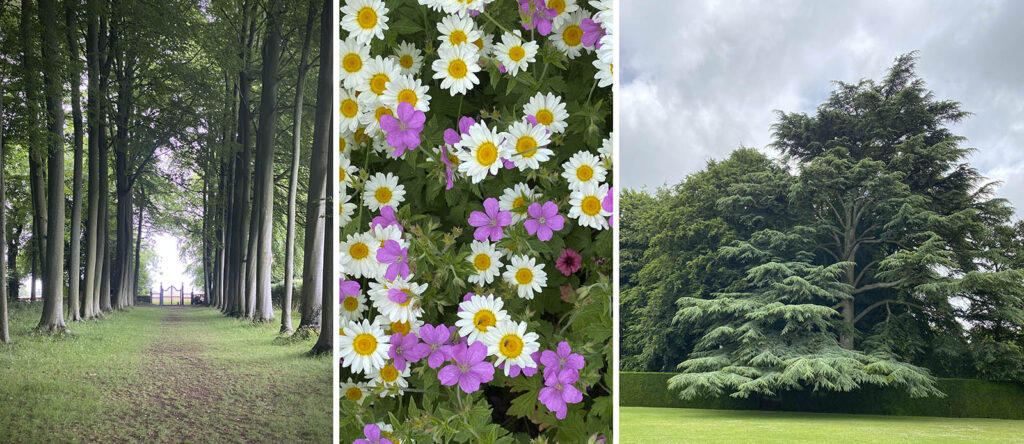
Another highlight for us was Chedworth Roman Villa, one of the largest Roman villas in England, dating from its heyday in the 4th century. As with other of the Roman villas I’ve visited I am reminded how elegant and beautiful the life of rich Romans was—putting much of our modern architecture and lifestyle to shame. The idea of having different dining rooms for each seasons to take advantage of the patterns of sun, shadow, and views is inspirational to me, and it was great fun to stand in the footprint of the summer dining room looking out at basically the same view that they had centuries before.
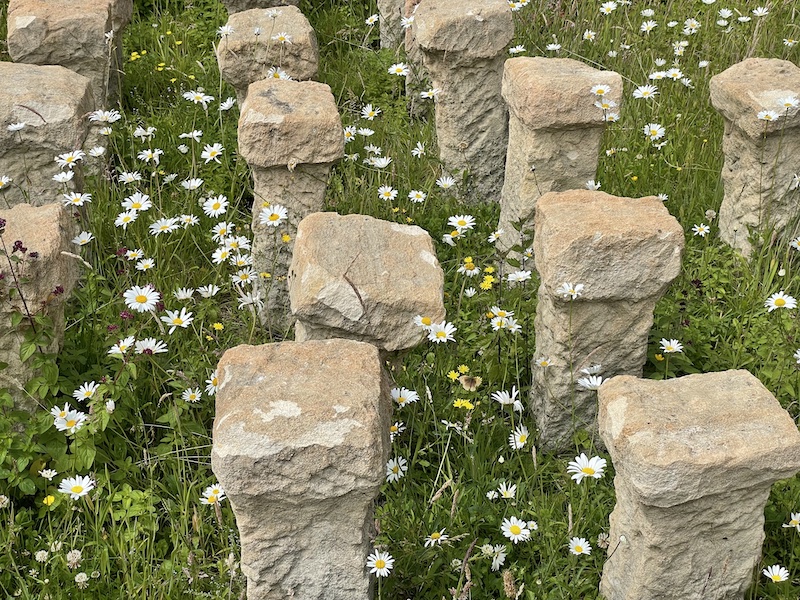
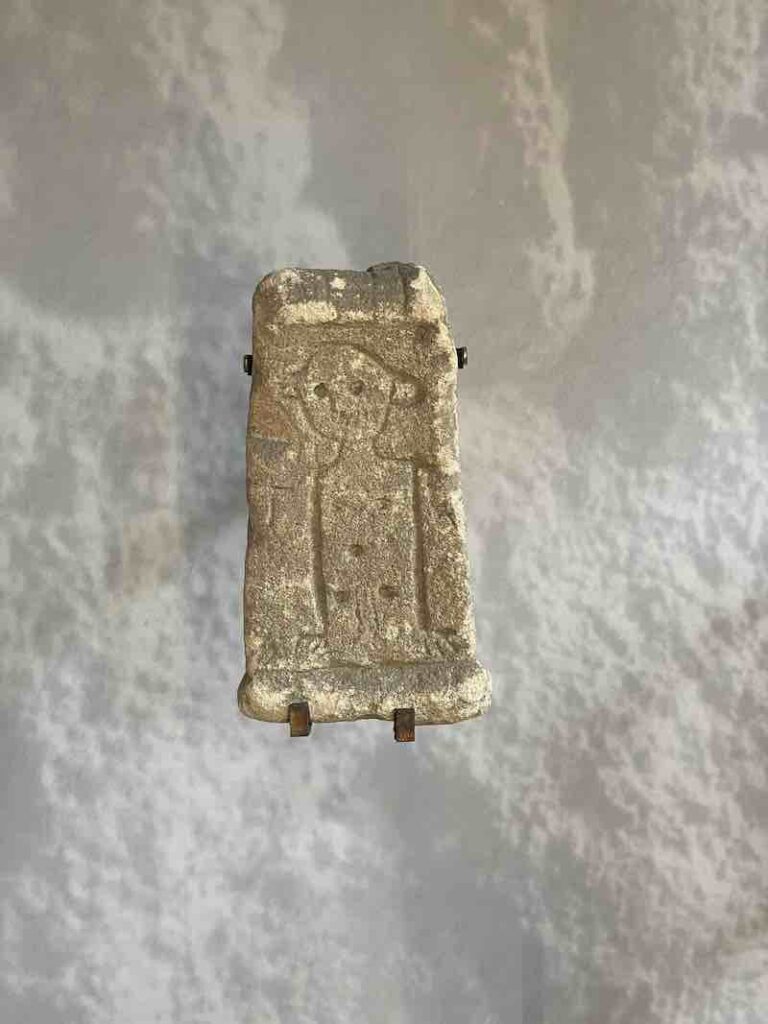
By evening John is not feeling well at all, the first of the three of us to succumb. He tests positive in the morning. Sebastian and I are still testing negative. We are supposed to head to London for a action-packed few days with even more family, but that is clearly off the table. We decide to head back to France to wait it out because if something goes really badly health-wise we want to be out of Britain’s painfully underfunded and understaffed NHS and into the French health system. We pack up the car and head toward the tunnel.
Getting real, fast
It also happens to be results day for Sebastian for the IB exam, which are supposed to be posted at noon. We are driving along on an unseasonably cold day, with all the car windows open, trying to avoid getting John’s germs, in the off chance it makes any difference at this point. John is in the backseat with his head resting on a metal fan while we bounce down the road, all wrapped up to try to stay warm through his fever. I kindly ask whether he’d like the dog blanket to cushion his head, which he refuses saying that the cold metal feels good. Sebastian is next to me hitting refresh on the results site, which isn’t responding due to the large number of students checking, and trying not to let me see what he is doing as he huddles next to the passenger door. As we approach Folkestone I see his face turn pale. His marks were over in every category for his offer except one. We have no idea what this means, but it’s not good news. He met his offer for St. Andrews, but at this point has his heart set on Oxford. The news feels gutting. I could so clearly imagine him there. And I am also surprised by the force of my feelings—what of this reaction is about me, and what is really about him? And feeling bad about feeling bad—having either of these options is an enormous privilege—why are we feeling so strongly that this isn’t the right outcome?
The ride back on the Eurotunnel train is silent as we sit in our car underwater in mood as well as body. We exit in Normandy and head to a little gîte, built in the 1700s, I’d found that was self-contained, allowed a dog, and we could have for a week—one of five available at the last minute in all of France. Our plan is to reunite with the family in the Loire valley at a small chateau we’d all rented after we’d weathered the Covid storm. John heads directly up the tiny ladder-like stairs to bed, Sebastian and I are madly calling his school to get advice. He and I are still negative but feeling worse every day. Finally, I test positive as well. I don’t remember much about this week except a couple of trips into Five Guys burgers because we could order and eat outdoors, away from everyone. And the beautiful color of the drying flax when I could muster the strength to walk to the end of the driveway and look over the fields. (Spoiler alert: It all did work out in the end for Sebastian after his problem exam was regraded, and we’ve just returned from dropping him off. This summer reinforced the idea of not giving up until all roads are followed to their end. And patience, as it wasn’t all resolved until the very end of August.)
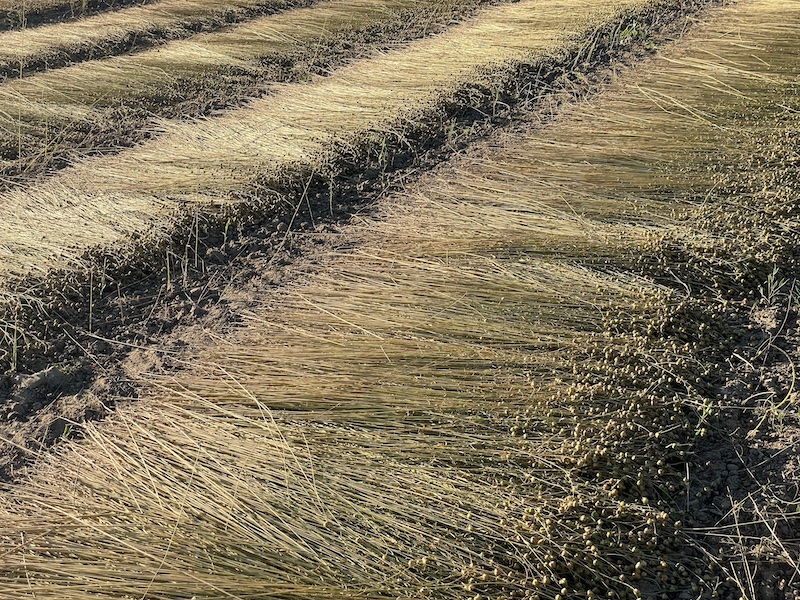
John is finally negative, but I am not. Fortunately the chateau for our next leg had a maid’s room with a single bed off the kitchen with its own bathroom, perfect for me, so we all decide to go ahead with the next stage of the vacation, and we are off to the Loire. We make one stop enroute at Jumièges Abbey, a Benedictine monastery that dates back to 654. As with many ruined churches and monasteries in France it reached its end after the French revolution when the grand buildings were raided for their riches, stones, and lead roofs, leaving only impressive ruins behind that only hint at the extravagance that was once there.
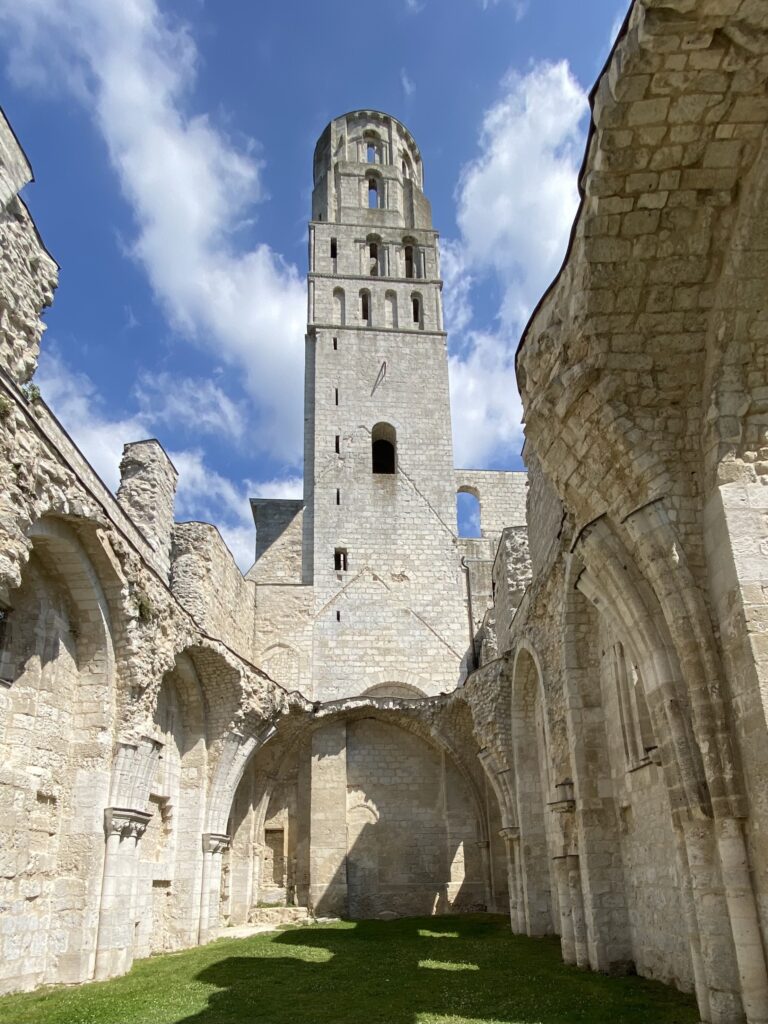
The Land of Castles
The Loire valley is the rich heartland of France, filled with chateaus. As John observed, you can drive for hundreds of miles in Italy, which was a much poorer country, and not see a house the size of these—hundreds of rooms, surrounded by beautiful gardens—but here we seemed to see one every few miles.
Our rental chateau, called Chateau Alaire, was a mere speck compared to its neighbors, but charming. We cook a lot, picnic, and take a walk to visit a church dating from the millenium which the local tourist office gave us the key to for the day (hero shot at the top), but mostly I lounge about masked and rest. We are located next to a couple of well-known French villages, Montrésor and Loches, but I keep noticing a very odd thing about the villages we were seeing, that even my niece’s seven year old daughter brought up, is that they are creepy. Immaculate and perfectly restored, but they seem to lack any semblance of life—no cafes, no old people standing out on the street and talking, no lights on in houses at night, not a single small, tempting bakery or restaurant. Although it’s the height of summer it felt as though everyone had left but us. A sign of too many second home owners sucking the life out of little towns. And yet there we were, searching for lunch, sleeping in a rented out second home. I started to yearn for our thriving, quirky, and very alive village in Italy.
The adventure that didn’t happen
The next leg of our planned journey was the biggest part of the adventure—three nights on a barge on a canal in Burgundy. Something I’d been curious about doing for years. I’m still not testing negative and as we’d be in such tight quarters, 12 of us on the boat, we decide to head back to Italy and forgo this particular adventure. And it sounds like it was a stroke of luck, especially as one of the intense heat waves that hit France this summer was gearing up for another strike. Christine Sarkis, my niece and travel entrepreneur, writer, and editor, who was on the barge, wrote about it for Itch, which I will share in a separate post.
As we start the long trek home it’s apparent that this “vacation” profoundly reinforced that nothing can truly be counted on—not health, weather, conditional admissions, or good times that we assume will happen as we plan ahead. Although always true—and the more at peace I am with this the happier I become—it’s an aspirational state for me and it’s of maximum importance to strengthen those muscles now. Grab the moments that delight you and hug them tight and try to let the rest go. And don’t forget to breathe.
Resources:
— Our cottage in Normandy, at Gîtes Normands de charme les châtaigniers, known to us as the Plague House, was one of five cottages a rural and beautiful property, watched over by an old horse. Ten kilometers from the sea and a couple of lovely towns. Reviewers said that some of the cottages were pretty unbelievably tiny, but ours, the section on the right of this photo, was small but manageable and had some lovely architectural touches.
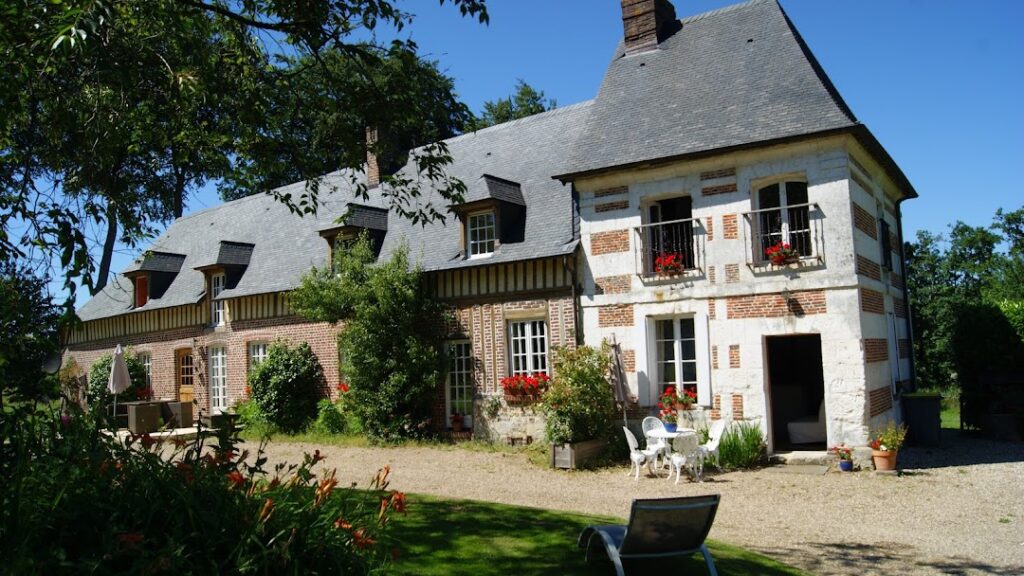
— Beaune, France might be a bit overrun with tourists, but it at the heart of Burgundy and has a delightful Saturday market. There’s also one of the most stunning kitchenware stores I’ve ever seen, The Cook’s Atelier, run by an American woman, her daughter, and her son-in-law. Sets of antique cleavers, copper pots, and the like. They also run a cooking school and have cookbook we really like which is orderable from overseas. We’ve stayed in both the Najeti Hôtel de la Poste and the Hotel Remparts, both were lovely and located in the middle of things.
— Somewhere outside of Turin… When driving from France to Italy the Turin area is a convenient place to stop. We found this aged beauty, the Sina Villa Mathilde, and enjoyed it. John pointed out that it reminded him a bit of business trips to India. A kind of faded colonial glory surrounded, right up to the property walls, by not the most pleasant urban sprawl, but once you are in the walls and the hotel’s large garden it’s a different world. Not bad food either.






No Comments